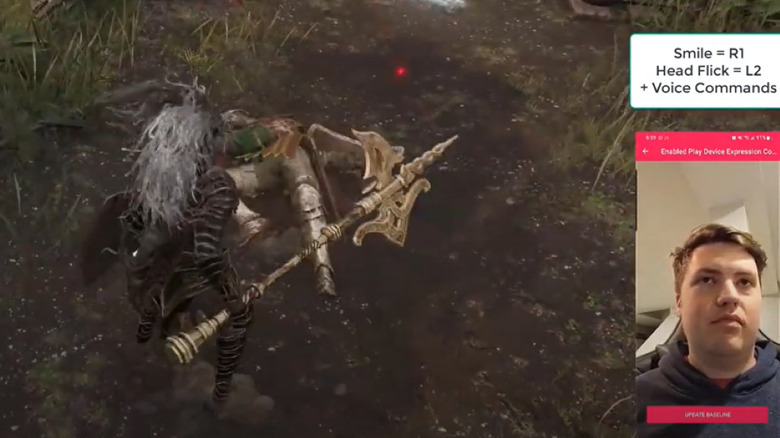This New Tech Lets You Game With Just Your Face
Increasing accessibility for video games has been a positive trend for the industry in recent years. More and more, developers have been striving to make sure their games can be enjoyed by as many people as possible. The University of Washington's Disabilities, Opportunities, Internetworking, and Technology (DO-IT) Center has reported on the advances in games' accessibility and the numerous titles that have incorporated accessibility features. In recent years, "Call of Duty: Warzone" has seen options added to help the hearing impaired and Sony has ensured that gamers can turn off certain features on the PS5 controller that could harm players with joint or muscle pain. Bethesda director Todd Howard has even said that accessibility is the future of gaming. Now, one developer is taking another leap forward with new technology that will allow gamers to control the action by face and voice.
The Washington Post recently reported on Alex Dunn and his mission to make games more accessible. Dunn, who is only 26 and taught himself programming, was motivated by wanting to help his brother and others like him who have disabilities. During the pandemic, the brothers started playing games online together and Dunn began to see the challenges faced by those who struggle to use a standard controller. He initiated work on a better way for those with disabilities to game and the result is Enabled Play
New technology allows greater accessibility
With Enabled Play, gamers can hook a device up to a controller or mouse and keyboard and program it to translate their voice and movements into input responses. Enabled Play is capable of processing hand gestures, head movements, facial expressions, and voice commands. It can even be programmed to respond to sounds other than spoken words for those who are unable to speak. While a bit on the expensive side, selling for $249.99, it is a remarkable technological advance and a big leap forward for gamers with disabilities. The Washington Post also notes that it's far less expensive than many comparable devices.
Dunn also sees the possibility of this technology becoming an education tool. Enabled Play is currently offering a service to schools that will include a discount on large orders of the devices and special training for faculty and staff on how to use them to help students.
Along with other recent developments and publications, like Can I Play That? (which helps gamers with disabilities find and play accessible games), Enabled Play should be a great support for many players out there. The technology itself is remarkable, but the impact it could have on a vulnerable community may be even better.


